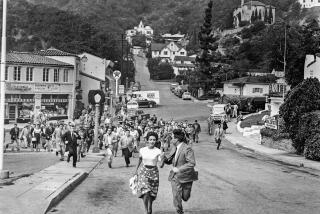‘Fast Times,’ ‘All American High’: Two views of 1980s teen life
- Share via
One is a classic of the teen high school genre, the other a short but pungent documentary that hasn’t been seen in 25 years. Together, “Fast Times at Ridgemont High” and “All American High” capture a time capsule of teen life in the 1980s from complementary perspectives.
American Cinematheque will present the double feature Aug. 17 at the Aero Theater in Santa Monica. “Fast Times” director Amy Heckerling and “All American High’s” Keva Rosenfeld will discuss their directorial debuts in a Q&A after the screenings. The filmmakers are friends, having met three decades ago. The films started their own dialogue back then as well.
“‘All American High’ really confirms the reality of ‘Fast Times,’” said Grant Moninger, programmer for American Cinematheque. “There are iconic characters in both of them that are very true.”
GRAPHIC: ‘80s heroes reload: Schwarzenegger, Stallone and Willis take aim at new villains
“Fast Times” was first, coming out in 1982. Heckerling landed the gig thanks to producer Art Linson, who saw her student film. “He thought that the sexuality was so awkward that I would capture the reality of being a young person,” Heckerling said. (And she’s still at it, directing an episode of “The Carrie Diaries” in New York.)
Yet the film that gave the world Sean Penn’s inimitable Jeff Spicoli was almost shelved by the studio. As Heckerling recalled, the story of sex, drugs, rock and repercussions fared poorly at test screenings in Orange County. “So it came out in just a couple of hundred theaters, on the West Coast only, with virtually no advertising.”
Positive word of mouth eventually led to its release nationwide. In the 31 years since, the film has made all sorts of classic-movie lists, including AFI’s top 100 comedy films.
Heckerling’s connection to Rosenfeld began in the “Fast Times” editing room. Her editor, Eric Jenkins, had a picture on his wall, “a life-sized face of somebody, and it was Keva,” she said. (Rosenfeld had previously worked as Jenkins’ assistant editor.) “So he became a personality before I even met him.” Once they did meet, they became friends, even hosting New Year’s parties together over the years.
PHOTOS: More of the ‘80s: Don’t call it a comeback
Rosenfeld was a big fan of “Fast Times.” Growing up in Encino, he had never seen a movie that represented his own experience so accurately. He praised Penn’s Spicoli for its accuracy as “that doofus-saint character that I knew growing up.”
After film school, Rosenfeld was editing at a studio that had piles of short ends — leftover unused film — that he was free to use. He chose Torrance High’s class of 1984 for his first close-up. “I sort of saw it like a real-life ‘Fast Times,’” he said.
He’d initially planned to follow six students, but halfway through the school year, because of time and money constraints, he chose one to focus on — Finnish exchange student Rikki Rauhala. “She had the perspective that we had,” he said, comparing her to the film crew. “Sort of a fish out of water.”
Through her eyes, we see the school’s slightly crazed social life, with its cheerleaders, keg parties and real-life Spicolis getting up early for surfing class.
PHOTOS: Billion-dollar movie club
The resulting 59-minute film screened in 1987 at the Nuart Theater, aired subsequently on PBS and pretty much hasn’t been seen since — with one notable exception. “Fast Times at Ridgemont High” had spawned a short-lived TV series called “Fast Times,” also headed by Heckerling. She held a screening of “All American High” for the show’s writers.
“It was terrific, we were really inspired by it,” executive producer Allen Rucker recalled. “I can’t remember what we stole from it, but I’m sure we stole something.”
After not seeing the film for about 25 years, Rosenfeld decided to open the vault and modernize its format. “I did it without even watching it, silently,” he said. Viewing at the finished product, he found an era caught in amber.
Last winter, after directing a commercial in Europe, he hopped over to Finland to visit Rauhala and filmed her and her children, one now in high school, as they watched the film. The visit has inspired him to interview a few more of the students, perhaps adding an addendum to the original film and re-releasing it. He posted a Facebook page about the screening for Rauhala, who sent it to her fellow alumni. A thousand people joined in the first four days.
“That’s a big change since then,” he noted drily. Fast times indeed.
More to Read
Only good movies
Get the Indie Focus newsletter, Mark Olsen's weekly guide to the world of cinema.
You may occasionally receive promotional content from the Los Angeles Times.










